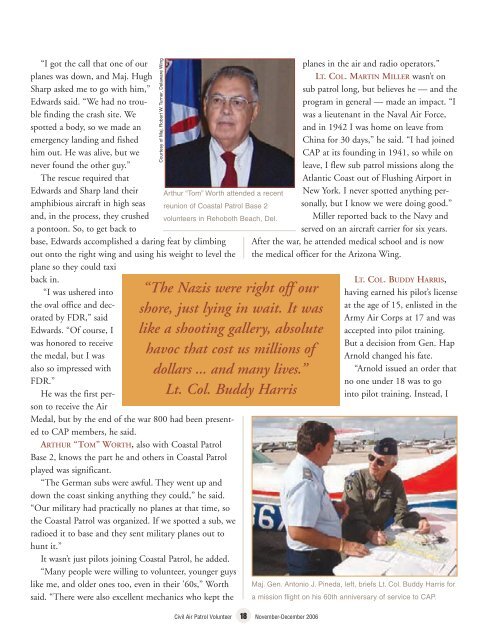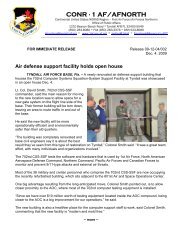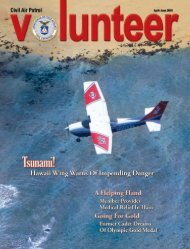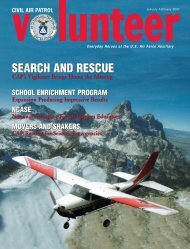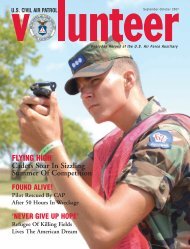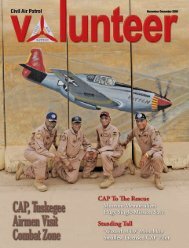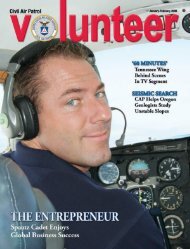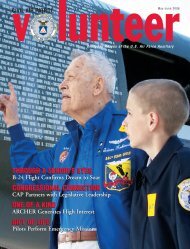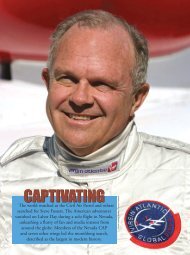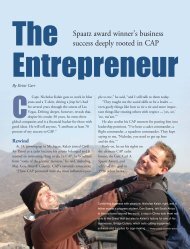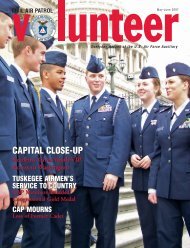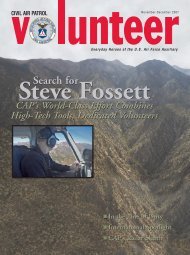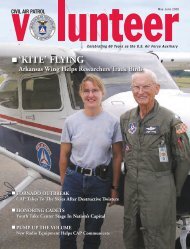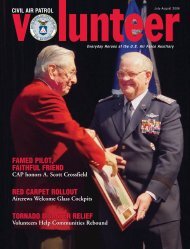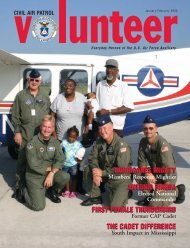You also want an ePaper? Increase the reach of your titles
YUMPU automatically turns print PDFs into web optimized ePapers that Google loves.
“I got the call that one of our<br />
planes was down, and Maj. Hugh<br />
Sharp asked me to go with him,”<br />
Edwards said. “We had no trouble<br />
finding the crash site. We<br />
spotted a body, so we made an<br />
emergency landing and fished<br />
him out. He was alive, but we<br />
never found the other guy.”<br />
The rescue required that<br />
Edwards and Sharp land their<br />
amphibious aircraft in high seas<br />
and, in the process, they crushed<br />
a pontoon. So, to get back to<br />
base, Edwards accomplished a daring feat by climbing<br />
out onto the right wing and using his weight to level the<br />
plane so they could taxi<br />
Arthur “Tom” Worth attended a recent<br />
reunion of Coastal Patrol Base 2<br />
volunteers in Rehoboth Beach, Del.<br />
back in.<br />
“I was ushered into<br />
the oval office and decorated<br />
by FDR,” said<br />
Edwards. “Of course, I<br />
was honored to receive<br />
the medal, but I was<br />
also so impressed with<br />
FDR.”<br />
He was the first person<br />
to receive the Air<br />
Medal, but by the end of the war 800 had been presented<br />
to CAP members, he said.<br />
ARTHUR “TOM” WORTH, also with Coastal Patrol<br />
Base 2, knows the part he and others in Coastal Patrol<br />
played was significant.<br />
“The German subs were awful. They went up and<br />
down the coast sinking anything they could,” he said.<br />
“Our military had practically no planes at that time, so<br />
the Coastal Patrol was organized. If we spotted a sub, we<br />
radioed it to base and they sent military planes out to<br />
hunt it.”<br />
It wasn’t just pilots joining Coastal Patrol, he added.<br />
“Many people were willing to volunteer, younger guys<br />
like me, and older ones too, even in their ’60s,” Worth<br />
said. “There were also excellent mechanics who kept the<br />
Courtesy of Maj. Robert W. Turner, Delaware Wing<br />
“The Nazis were right off our<br />
shore, just lying in wait. It was<br />
like a shooting gallery, absolute<br />
havoc that cost us millions of<br />
dollars ... and many lives.”<br />
Lt. Col. Buddy Harris<br />
planes in the air and radio operators.”<br />
LT. COL. MARTIN MILLER wasn’t on<br />
sub patrol long, but believes he — and the<br />
program in general — made an impact. “I<br />
was a lieutenant in the Naval Air Force,<br />
and in 1942 I was home on leave from<br />
China for 30 days,” he said. “I had joined<br />
CAP at its founding in 1941, so while on<br />
leave, I flew sub patrol missions along the<br />
Atlantic Coast out of Flushing Airport in<br />
New York. I never spotted anything personally,<br />
but I know we were doing good.”<br />
Miller reported back to the Navy and<br />
served on an aircraft carrier for six years.<br />
After the war, he attended medical school and is now<br />
the medical officer for the Arizona Wing.<br />
LT. COL. BUDDY HARRIS,<br />
having earned his pilot’s license<br />
at the age of 15, enlisted in the<br />
Army Air Corps at 17 and was<br />
accepted into pilot training.<br />
But a decision from Gen. Hap<br />
Arnold changed his fate.<br />
“Arnold issued an order that<br />
no one under 18 was to go<br />
into pilot training. Instead, I<br />
Maj. Gen. Antonio J. Pineda, left, briefs Lt. Col. Buddy Harris for<br />
a mission flight on his 60th anniversary of service to CAP.<br />
Civil Air Patrol Volunteer 18 November-December 2006


